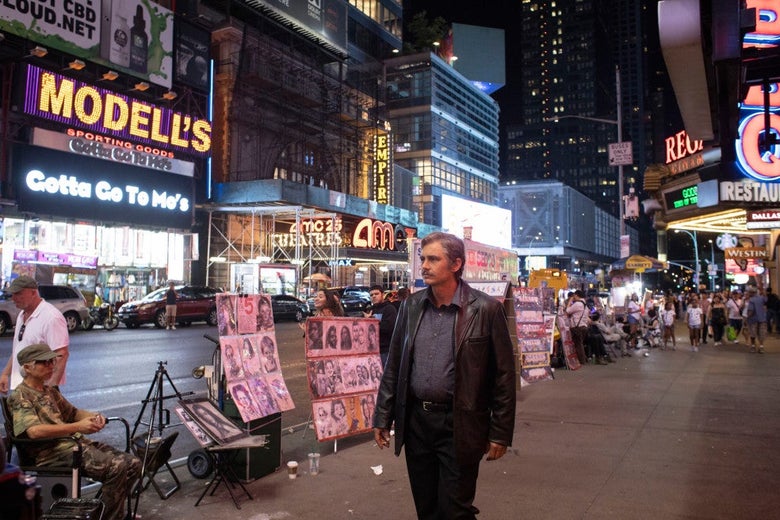
James Franco in The Deuce.
Paul Schiraldi
This article discusses the entirety of The Deuce’s third season.
The third and final season of HBO’s The Deuce, which concluded its run on Monday night, saw the gradual emptying out of mid-’80s Midtown, at least by the show’s characters. AIDS, gentrification, a new mob order, shifting law enforcement priorities, and the migration of the porn industry to Los Angeles, among many other social and economic phenomena, contributed to the seasonlong exodus. But in the series finale’s 13-minute epilogue, set in 2019 and seen through an elderly Vinnie Martino’s eyes, the 40s are repopulated once again by the pimps, prostitutes, gangsters, and beat cops we’ve come to know. The effect can’t not be nostalgic. The city that never slept by choice is now lit up at night with blinding billboards and elephantine signs for Applebee’s and Olive Garden—mall brands you can find in any American city. Tourists walk in every direction, forming a Babel of strangers where there once was an intimate (if highly exploitative) community. The women who paid the steepest prices for their brief stays in Times Square—Lori, who died by suicide, Ruby, who was murdered by a john, and Ashley, who was killed for attempting to provide an alternative to sex work—are remembered with little to no hint of their tragic ends. The yearbooklike resurrection of The Deuce’s bygone characters doesn’t exactly make for a peppy final chapter, but it does indulge the weakest of the show’s elements to such a degree that it feels like a betrayal of the drama’s gritty candor.
For a show ostensibly about upheavals in the sex-work industry during the 1970s and 1980s, The Deuce was curiously obsessed with its straight, white, male Trojan-horse protagonists. But unlike The Wire’s Jimmy McNulty, who occupied a similar role in creator David Simon’s earlier series, Vinnie and his brother, Frankie, seldom instigated or propelled the main action forward. The Martino twins were two in a stable of workhorses in the Gambino empire, and while we could see through them how the rise of the porn industry and the increasing independence of sex workers—both of which The Deuce traced—affected them as Mafia grunts, the brothers seldom felt indispensable to the series like Candy (née Eileen) or Lori or even Rudy did. Vinnie’s love triangle with Abby and Andrea never quite justified its screen time, even if Abby’s guilt-ridden do-goodery improbably did (probably because it illustrated the limitations of individual agency against structural forces). It didn’t help that, while James Franco has the perfect scampish smirk for the many occasions when one of his characters gets told to fuck off, the #MeToo allegations against the actor tarnished the series’ significant feminist ambitions.
Get Slate Culture in Your Inbox
The best of movies, TV, books, music, and more, delivered three times a week.
Sure, Vinnie is the (undeserving) center of The Deuce. But revisiting the show’s storylines through his point of view feels like a misstep, since he’s one of the very few characters who can afford to be nostalgic for the Hi-Hat’s heyday. Season 3 saw Candy’s artistic aspirations crushed (with pornographic features quickly going the way of silent film) and her personal life ultimately in shambles, estranged from her addict son and unable to reconcile her need for autonomy with the compromises inherent to any long-term romantic relationship. Candy also had to accept the fact that, however impressive her individual triumphs, her work was based in an industry built on chewing up and spitting out women—women like Lori, who discovered that the celebrity status she achieved mattered little in a fiercely competitive business where the pros, under threat by unpaid amateurs, had to settle for evermore dangerous and degrading work. While Lori was boxed in by her addiction and the trappings of her peculiar fame (“Now that the movies are on tape, there’s no such thing as an ex–porn star,” says Candy in an unhelpful bit of wisdom), Loretta was so embittered by what she’d seen and experienced that she joined Andrea Dworkin’s anti-porn movement. (One of the biggest achievements of The Deuce’s third season was making such an extreme and doomed crusade seem understandable and righteous, if still misguided.) The worst thing Melissa had to contend with was her father’s reminders that she couldn’t go back home again, but she also had to come to peace with Reg’s imminent death. (Paul probably wasn’t far behind; Lori, Frankie, and Rudy were already dead by the finale.) If Vinnie’s recollections of trash- and vice-strewn Midtown are fond—even with Frankie’s death hanging in the air—it’s because he never suffered the worst of it.
Midway through this season, Darlene, who had given up sex work at the end of Season 2, reappeared needing Abby’s help. The former prostitute had aced all her nursing coursework, but her criminal record stood in the way of her license. Abby testified to her old friend’s stalwart character, but because Abby herself was the manager of a bar, it remained unclear whether Darlene ever got to become a nurse. It was a small storyline, but its lack of resolution was haunting, underscoring one of The Deuce’s greatest and most distinct strengths: its unflinching exploration of the manifold and frequently unforeseen costs of sex work. But that very insight seems strangely amiss in The Deuce’s epilogue, as the prostitutes and porn stars we’d come to know as fully fleshed-out humans get flattened once again in Vinnie’s memory, smiling or scowling or sarcastic, but no more than a blip in time. Just another hazard of their profession, I guess—but, as always, they deserved more.
from Slate Magazine https://ift.tt/2MTj8PQ
via IFTTT
沒有留言:
張貼留言